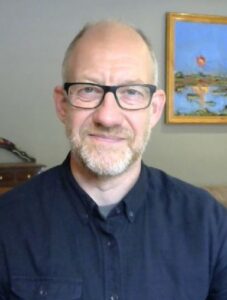Meet Geoff Smith
Geoff Smith is a Regional Postgraduate Dean, HEE South West Chair, JAG Training Group (& very part time) Bowel Cancer Screening Colonoscopist.
What attracted you to a career in gastroenterology/hepatology?
I would love to say that it was the combination of procedural skills, science, and patient care, however the sad truth is that the fact that the gastro research fellows at the Digestive Diseases Research Centre at the Royal London Hospital when I did an intercalated B.Sc., notably their joie de vivre, probably had at least as much to do with it!
My ‘second’ career, as the Postgraduate Dean in the South West, is the culmination of many years of working within clinical education and training, and the firm belief that the best way to ensure great patient care is to train our workforce to be as good as they can be. My career has encompassed ensuring a consistent and up to date knowledge base (through the Specialty Certificate / European Section Examination in Gastroenterology and Hepatology) and ensuring that patients get the best endoscopy on the planet (through working with JAG). Looking back, it is easy to see the positive impact.
What advancement in gastroenterology/hepatology are you most excited about and why?
There are so many to choose from! Capsule endoscopy allowed us to really visualise the small bowel for the first time – before Paul Swain’s ingenuity, the small bowel may as well have been in another multiverse. Biologicals revolutionised managing inflammatory bowel disease and saved unknown numbers of resections. In the end though, the professionalisation of endoscopy, the drive for high quality, and the roll out of bowel cancer screening has probably saved more lives and is the aspect of being a gastroenterologist about which I am most proud.
What do you enjoy most about your work?
Being ‘the Dean’ is challenging, frustrating, and my dream job! The ability to bring about real change and innovate in training (for example the South West Endoscopy Training Academy), and being empowered to drive strategy feels like a million miles away from being an NHS gastroenterologist. Having said that, I still love talking to the team and patients during my BCSP lists.
What is the one thing you would change?
Inequity. I recall hearing a ‘tzar’ say that if you choose to live in Cornwall you should accept that your nearest MRI scanner is 80 miles away. We have to ensure that we provide equity of access to healthcare (both workforce and resources), whether you are in Chelsea or Bodmin. Our great challenge in the NHS is to bring that about. That remains key whether it is ensuring that every healthcare worker is trained to achieve all that they are capable of, irrespective of their profession or background, or making sure that wherever and whoever you are you can access the best care we can provide in the UK.
What’s the best advice you’ve been given in your career?
I was told by an eminent gastroenterologist (I know he was eminent as he had written a textbook) that I would never be a gastroenterologist, nor work in a teaching hospital, and definitely not one in London. That ‘advice’ made me more determined than ever – and 17 years as a consultant at Imperial proves that advice can be ‘good’ in all sorts of ways!
There are countless individuals I could name who have provided support and guidance (whether they realised it or not), but special mention should go to Julia Whiteman, the recently retired North West London Dean, Parveen Kumar, and Jeremy Levy for inspiring my approach to education and training, and Peter Mills and John Martin for showing me that a quiet but determined voice can be at least as effective as being emotional and shouty. It’s a lesson that I hope to learn one day.
The best advice I was ever given came, however, from my Dad, who died of complications of an ERCP at the age of 50. He taught me to learn from the bad as well as the good – years before reflective practice became a ‘thing’ and to see the opportunity in every knock back. He always told me to grab opportunities when they came – which explains why I am writing this in the middle of the Devon countryside rather than West London.
What does being a BSG member mean to you?
Quality, expertise, and friendship. BSG has supported the SCE / ESEGH process throughout, supported JAG in pushing the endoscopy quality agenda, represented all professions associated with the specialty, and ensured the voices of trainees and patients were consistently heard. It also gave us a journal that has appeared on ‘Have I got News for you’ and an annual meeting that has acted as the forge for great friendships and memories.
If you are interested in taking part in our Meet our Members initiative, please contact the BSG Communications team.
